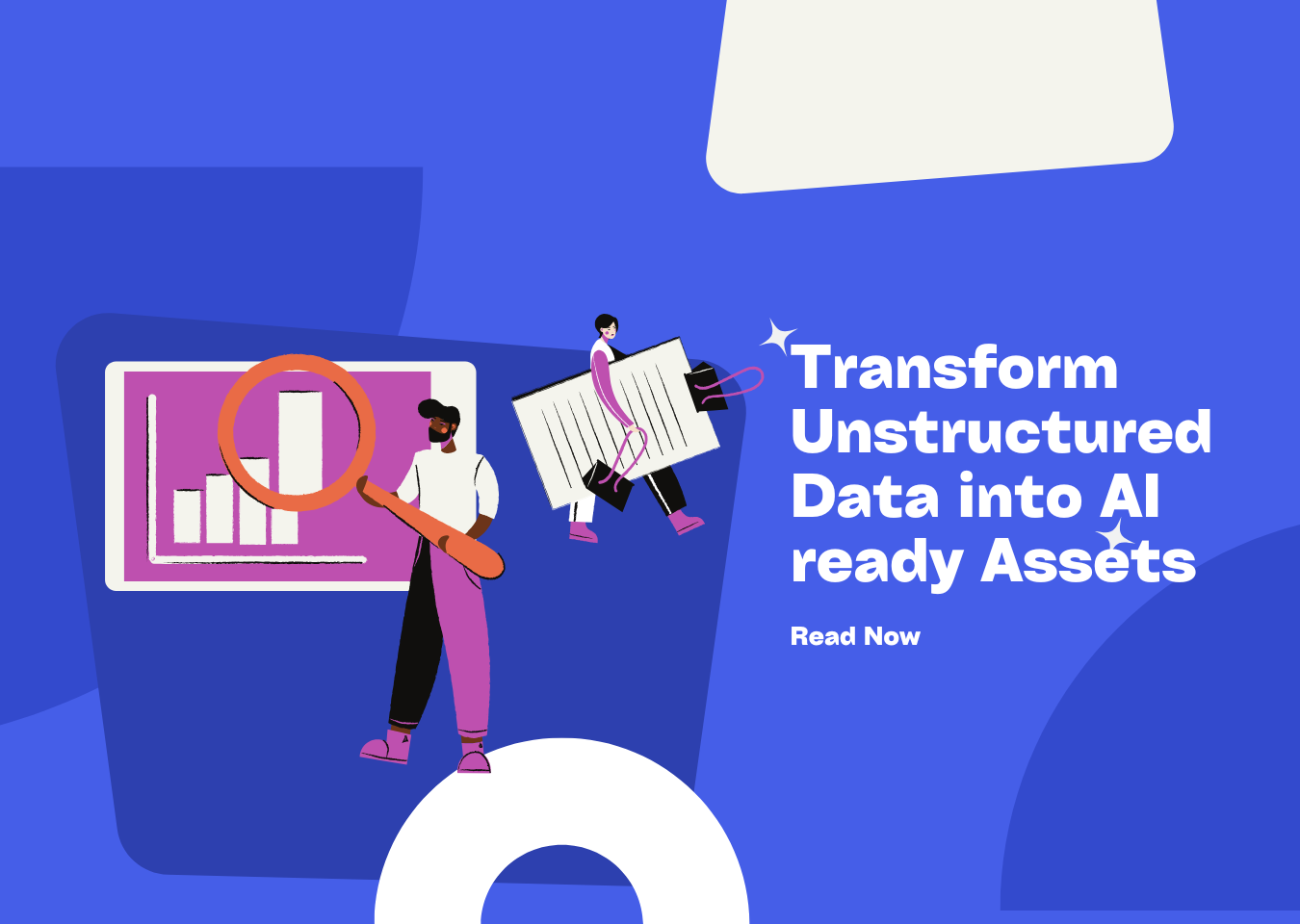Unlocking Legal AI: Solutions for Unstructured Data in Document-Centric Work


Introduction: Drowning in Data? AI is Your Lifeline.
The legal industry is awash in unstructured data. Contracts, emails, case files – the sheer volume can be overwhelming. But what if AI could help make sense of it all, transforming chaos into clarity and unlocking unprecedented efficiency?
Legal firms are estimated to hold over 80% of their data in unstructured formats. Manually sifting through this mountain of information is not only time-consuming but also incredibly expensive. According to a recent study by McKinsey, AI-powered solutions can reduce document review time by up to 90%, leading to significant cost savings and a competitive edge. This blog post explores concrete solutions for managing and extracting value from unstructured data using AI, empowering legal professionals to thrive in the digital age. Solutions like UndatasIO are emerging to tackle this challenge head-on, offering a streamlined approach to transforming unstructured data into AI-ready assets.
The Challenge: Untangling the Unstructured Mess
What is Unstructured Data?
Unstructured data lacks a predefined format, making it difficult to process and analyze using traditional methods. In the legal field, this includes contracts, emails, transcripts, legal briefs, and a myriad of other document types. Unlike structured data, which resides neatly in databases, unstructured data requires advanced techniques to extract meaningful insights.
The Pain Points for Legal Professionals
Unstructured data presents a multitude of challenges for legal professionals. Imagine spending countless hours manually reviewing documents, struggling to identify relevant information, and facing the ever-present risk of errors and missed deadlines. This not only drains resources but also increases the risk of non-compliance with data privacy and security regulations. The high costs associated with traditional document processing methods further compound these issues.
Security and Compliance Risks
Handling sensitive legal data carries significant security and compliance risks. Data breaches, compliance violations (e.g., GDPR, CCPA), and ethical considerations are paramount concerns. The confidentiality and integrity of client information must be protected at all costs, making robust security measures essential. Failure to do so can result in severe penalties and reputational damage.
AI to the Rescue: Solutions for Unstructured Data
Natural Language Processing (NLP)
Natural Language Processing (NLP) is a game-changer for legal AI. It enables computers to understand and extract information from legal documents with remarkable accuracy. Imagine being able to automatically summarize lengthy contracts, identify key entities, and analyze the sentiment expressed in legal briefs.
NLP applications in legal AI are vast and transformative. Text summarization condenses large documents into concise summaries, while entity extraction identifies key people, organizations, and dates. Sentiment analysis gauges the emotional tone of legal texts, and topic modeling uncovers hidden themes and patterns. Contract analysis, perhaps one of the most impactful applications, identifies clauses, obligations, and potential risks with unparalleled speed and precision.
Machine Learning (ML)
Machine Learning (ML) algorithms can be trained to classify documents, predict outcomes, and automate a wide range of legal tasks. This technology empowers legal professionals to make data-driven decisions and streamline their workflows.
Document classification, for example, automatically identifies document types and their urgency. Predictive coding for eDiscovery accelerates the process of identifying relevant documents in litigation. ML also enhances legal research and case prediction, providing valuable insights for legal strategy. Furthermore, ML facilitates risk assessment, enabling legal teams to proactively identify and mitigate potential liabilities.
Intelligent Document Processing (IDP)
Intelligent Document Processing (IDP) represents a comprehensive solution for automating document processing, revolutionizing how legal teams handle unstructured data. IDP combines several AI technologies, including Optical Character Recognition (OCR), NLP, and ML, to extract, classify, and validate data from unstructured documents.
Key features of IDP include Optical Character Recognition (OCR) for converting scanned documents into editable text, advanced data extraction using NLP and ML, intelligent document classification, and streamlined workflow automation. This holistic approach transforms unstructured data into actionable insights, empowering legal professionals to make informed decisions and improve efficiency. UndatasIO excels in this area, providing a robust platform to transform unstructured legal data into AI-ready assets with unparalleled accuracy and speed.
Knowledge Graphs
Knowledge graphs represent relationships between legal concepts and entities, providing a powerful tool for legal research, case analysis, and knowledge management. By visualizing these connections, legal professionals can gain a deeper understanding of complex legal issues and identify relevant precedents more efficiently. This technology enhances collaboration, accelerates research, and improves the overall quality of legal work.
Implementing AI Solutions: Key Considerations
Data Quality and Preparation
Data quality is paramount for AI model performance. Accurate and reliable data is essential for training effective AI algorithms. Data cleaning, preprocessing, and annotation techniques are crucial steps in ensuring data quality.
Data cleaning involves removing errors and inconsistencies from the data, while data normalization standardizes data formats for consistent processing. Data annotation involves labeling data for training ML models, enabling them to learn and make accurate predictions. UndatasIO simplifies this process by offering automated data cleaning and preprocessing features, ensuring your AI models are trained on the highest quality data.
Choosing the Right Technology
Selecting the right AI tools and platforms for specific legal needs requires careful consideration. Factors such as cost, scalability, ease of use, and integration with existing systems must be evaluated.
Consider the cost and ROI of different AI solutions, as well as their scalability and performance capabilities. Ensure seamless integration with existing systems to avoid disruption and maximize efficiency. Evaluate security and compliance features to protect sensitive legal data. Finally, consider the vendor’s support and expertise to ensure successful implementation and ongoing maintenance. When evaluating solutions, consider UndatasIO for its ease of use, scalability, and comprehensive feature set, designed specifically for transforming unstructured data into valuable AI assets. While tools like unstructured.io and LlamaIndex offer parsing capabilities, UndatasIO distinguishes itself with a more robust and integrated platform designed for enterprise-grade AI applications, focusing not just on parsing but on complete data transformation and preparation.
Addressing Bias and Ensuring Fairness
Addressing bias in AI models is crucial for ensuring fair and equitable outcomes. Bias can inadvertently creep into AI models, leading to discriminatory results. Techniques for detecting and mitigating bias are essential for promoting justice and fairness.
Implement bias detection and mitigation techniques to identify and correct biases in AI models. Employ Explainable AI (XAI) to understand model decisions and ensure transparency. Regularly monitor and audit AI models to detect and address any emerging biases.
Data Security and Privacy
Protecting sensitive legal data requires robust security and privacy measures. Encryption, access controls, and compliance with data protection regulations are essential for safeguarding client information. Implement end-to-end encryption to protect data both in transit and at rest. Enforce strict access controls to limit access to sensitive data. Ensure compliance with data protection regulations such as GDPR and CCPA.
Real-World Examples: AI in Action
Case Study 1: Litera
Litera, a legal technology solutions provider, offers comprehensive AI-powered tools for document review, contract analysis, and knowledge management. Their solutions have helped numerous law firms reduce document review time by up to 70% and improve accuracy in contract analysis.
Case Study 2: Kira Systems
Kira Systems uses machine learning for contract analysis, helping legal teams quickly identify key provisions and potential risks. They report that their clients have seen significant time savings and improved accuracy compared to manual review processes.
The Future of AI and Unstructured Data in Law
The future of AI in law is bright, with emerging trends poised to revolutionize the industry. Generative AI is poised to transform legal drafting and research, enabling legal professionals to create high-quality documents and conduct in-depth research with unprecedented speed.
AI will play an increasingly important role in legal prediction and risk assessment, enabling legal teams to anticipate potential outcomes and mitigate risks proactively. The integration of AI with blockchain technology will enhance secure document management, ensuring the integrity and confidentiality of legal data. Furthermore, AI-powered virtual assistants will become increasingly prevalent, providing legal professionals with on-demand support and assistance.
Conclusion: Embrace the AI Revolution
Using AI to manage unstructured data offers significant benefits for legal document-centric work. From reducing costs and improving efficiency to enhancing accuracy and mitigating risks, AI is transforming the legal industry.
Ready to unlock the power of AI for your legal practice? UndatasIO can help you transform your unstructured legal data into AI-ready assets, enabling you to build cutting-edge AI applications and stay ahead of the curve. Try UndatasIO Now! Explore AI solutions to transform your legal processes. Contact us for a free consultation or demo. Subscribe to our newsletter or download a whitepaper for more information. Don’t get left behind; embrace the AI revolution and unlock the full potential of your legal practice.
📖See Also
- In-depth Review of Mistral OCR A PDF Parsing Powerhouse Tailored for the AI Era
- Assessment-Unveiled-The-True-Capabilities-of-Fireworks-AI
- Evaluation-of-Chunkrai-Platform-Unraveling-Its-Capabilities-and-Limitations
- IBM-Docling-s-Upgrade-A-Fresh-Assessment-of-Intelligent-Document-Processing-Capabilities
- Effective-Strategies-for-Unstructured-Data-Solutions
Subscribe to Our Newsletter
Get the latest updates and exclusive content delivered straight to your inbox